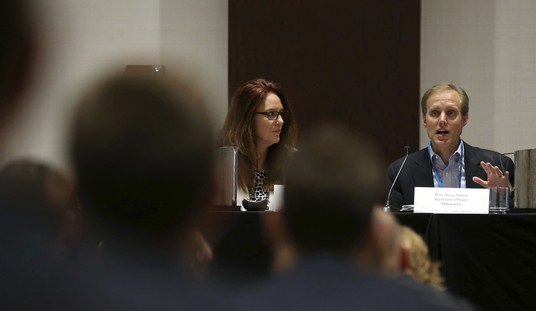“He delivers a good speech, he just doesn’t say anything.” That’s not only the analysis from Yahoo’s Breakout, but also Wall Street, as Matt Nesto and Jeff Macke point out in this analysis from yesterday. The Dow dropped 300 points the day after Barack Obama’s speech, which doesn’t surprise Nesto and Macke at all. All the speech delivered was a series of ambiguities, along with a chant that Macke says reminds him of his six-year-old child:
Macke writes about the shortcomings of the “plan”:
The President’s long-awaited address to Congress and the voting public wasn’t a matter of a “style over substance.” Obama delivered on the former, but there was little, if any, substance to chew on. The headlines were “$450 billion” and the phrase “pass this bill.” The dollar figure was largely meaningless and as Matt Nesto noted, the President’s call to pass the bill sounded more like the request of a salesman, not the mandate of a strong President.
Every aspect of the vague program was short-term in nature. The much reviled Wall Street is constantly criticized for focusing on the short-term, yet the same President, placing himself on the frontline of class warfare, offered tax cuts running only through 2013. If you’re currently planning or expanding a business you most likely are doing so with more than the next 5 quarters in mind. A major plant started today would be completed roughly at the same time as the proposed tax cuts expire. These tax breaks will do nothing to create jobs today.
He’s not the only one questioning the underlying assumptions of Obama’s Porkulus II. Employers say it won’t spur job creation, as reported by … the New York Times:
The dismal state of the economy is the main reason many companies are reluctant to hire workers, and few executives are saying that President Obama’s jobs plan — while welcome — will change their minds any time soon.
That sentiment was echoed across numerous industries by executives in companies big and small on Friday, underscoring the challenge for the Obama administration as it tries to encourage hiring and perk up the moribund economy.
But what about that hiring tax credit? As I wrote before the speech, that will benefit companies that are already hiring:
“You still need to have the business need to hire,” said Jeffery Braverman, owner of Nutsonline, an e-commerce company in Cranford, N.J., that sells nuts and dried fruit. While a $4,000 credit could offset the cost of the company’s lowest-cost health insurance plan, he said, it would not spur him to hire someone. “Business demand is what drives hiring,” he said. …
But the plan also includes incentives for companies to hire more workers, including a payroll tax cut for businesses and a $4,000 tax credit for those employers that hire people who have been out of work for six months or more.
To the extent these measures could be used, many employers said they would most likely support people whom companies were planning to hire anyway.
It’s Cash for Clunkers and the homebuyer tax credits all over again.
Moody’s chief economist Mark Zandi thinks that Obama’s plan (without having much in the way of detail) will add 2 full points to GDP and drop joblessness by 1%, but Mecke questions his motives:
Estimates on what the “American Jobs Act” would do for the economy range from our rather conservative figure of “nothing” to Mark Zandi’s view that passage of the still-nonexistent bill would add 2 points to GDP and hack 1% off the 9.1% unemployment rate. Mr. Zandi is employed by Moody’s, a ratings agency. It’s worth noting that it’s in Moody’s best interest to curry favor with the White House in light of the abuse being heaped upon fellow ratings agency Standard & Poors for having the audacity to express a negative view of the government. Not to suggest that Mr. Zandi is in any way conflicted in his opinion; it’s simply something to consider as the Administration rapturously embraces Moody’s view.
Eh, I don’t know about that. Zandi has always been a proponent of these kind of plans. It’s worth noting the connection, I guess, but only if Zandi did something out of character. This sounds like Zandi being Zandi. In this case, he seems to be in the minority, both about the effects of the proposal and the notion that there was enough to score.
Update: Just to underscore my point about Zandi, here’s his analysis in January 2009 about the Obama stimulus plan. He predicted that the stimulus bill would save or create 4 million jobs by the end of 2010.








Join the conversation as a VIP Member